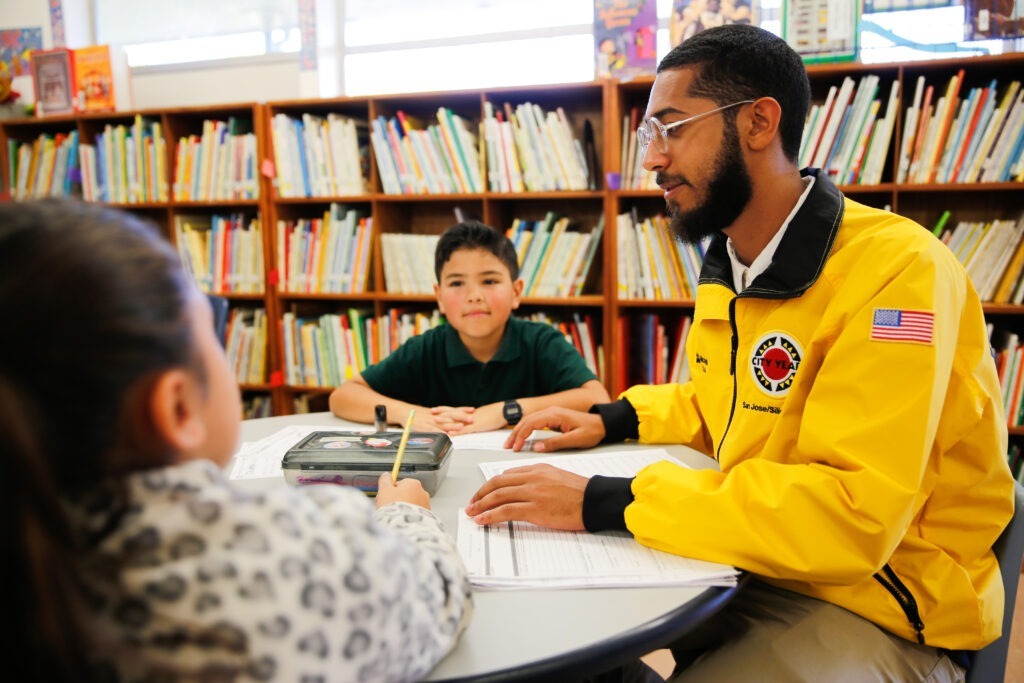California Student Success Coach Learning Network
Eight youth-serving organizations are expanding student success coaching into schools and extended learning programs throughout California, a first-of-its kind pilot led by City Year and supported by California Volunteers, the state’s service commission that oversees AmeriCorps programs.

Student Success Coach Learning Network
The Student Success Coach (SSC) Learning Network is replicating the student success coach model beyond City Year’s direct service footprint, reaching an additional 35,000 students in communities that don’t have a City Year school partnership.
“Through this effort to help other AmeriCorps programs develop their student success coach practice, we are reaching more than 20 additional under-resourced districts throughout the state of California,” said City Year CEO Jim Balfanz. “We believe the SSC model can help schools and communities address students’ needs post-pandemic and ensure more young people have the resources, environments and relationships they need to learn, develop and succeed in adulthood.”
Students working with student success coaches receive academic and social-emotional support, from college and career readiness and math and literacy support to access to mentors and an enhanced sense of belonging in school and agency in shaping their future.
Teachers, social workers and parents say that student success coaches provide much-needed additional capacity to their schools and afterschool programs.
“There is only one me,” said a school counselor at a school served by student success coaches. “Without a SSC, our office would not remain open. We need more student success coaches to serve our students.”
Strengthening pathways into teaching
Many of the young adults who are being trained as student success coaches have an interest in building a career in the education and youth development sectors. “By expanding the student success coach model, more diverse young people will gain exposure to these fields and will help to strengthen pathways into teaching,” says Maggie Franco, City Year vice president of education ecosystem and systems change, who oversees the California pilot.
“I have always wanted to a be a teacher,” said one student success coach. “Serving as a student success coach has reassured me that I belong in the classroom. It has given me a glimpse of teaching and what to expect when I enter the field.”
In addition to City Year Los Angeles, City Year Sacramento and City Year San José, the SSC Learning Network includes: BAYAC AmeriCorps San Francisco Bay Area; PASS AmeriCorps San Diego; Building Community, Changing Lives Porterville; Elev8 Alameda County; Equality California Mentorship Corps Central Valley and the Inland Empire; Improve Your Tomorrow California State; and Healthy Choices AmeriCorps San Francisco.

Student Success Coach Convening in Los Angeles
In late March, representatives and leaders from the eight organizations in the Student Success Coach Learning Network held their first in-person gathering in Los Angeles, which they called a residency. Participants came together to build community throughout the network; identify collective strategies that strengthen SSC talent pipelines across the State of California; learn how to raise awareness about student success coaching; and provide coaching opportunities that strengthen programming and leadership skills.
California Volunteers Chief Service Officer Josh Fryday offered welcoming remarks to the SSC Learning Network, calling the work of student success coaching “critical to California because you are investing the future of our children.”
Dr. Pedro Noguera, Dean of the USC Rossier School of Education and a leading authority on urban education policy and improvement efforts, praised the State of California for investing in the network pilot and shared his reflections on the role of student success coaching as the country continues to recover from the impacts of the pandemic.
“I think student success coaches go far to helping schools address so many needs that kids bring. Right now, our teachers are experiencing burnout because they’re on the front lines of trying to support kids with their academics, but also the huge mental health challenges and social needs that kids bring to school,” Dr. Noguera said.
“Having student success coaches in classrooms and working with schools brings an extra set of hands and an extra person who can build a trusting relationship with a student and keep them connected to school and to their education.”
Student success coaching promotes equity and belonging
Participants in the March convening were able to share how to effectively implement student success coach programs as well as compare notes on some of the challenges, said City Year Vice President Jennifer Boyce, who provides technical assistance to student success coach programs.
“The work of the SSC Learning Network reinforces the importance of building positive relationships with students and in schools and afterschool programs,” Boyce said.
“Student success coaching is about how do we as adults build more equity and belonging for children in schools and through youth-serving organizations so that children believe they are in places where they can thrive.”
Related stories
Every year, thousands of young people decide to join AmeriCorps programs for a year (or more!) of service, helping to...
Read more about Everything you need to know about returning for another year as a City Year AmeriCorps memberCity Year is committed to providing our AmeriCorps members with resources, opportunities and support that help them to achieve their...
Read more about Empowering Futures: City Year Baton Rouge’s Partnership with Bottom LineFatimah Abdulmateen takes service seriously. Fatimah served two years with City Year as an AmeriCorps member, making her an alum...
Read more about A City Year alum with a passion for service—both here and abroadThough this part of the City Year experience may be particularly challenging, it’s also normal! And we want you to...
Read more about The “mid-fall slump” in schools is real--here's what to expect















